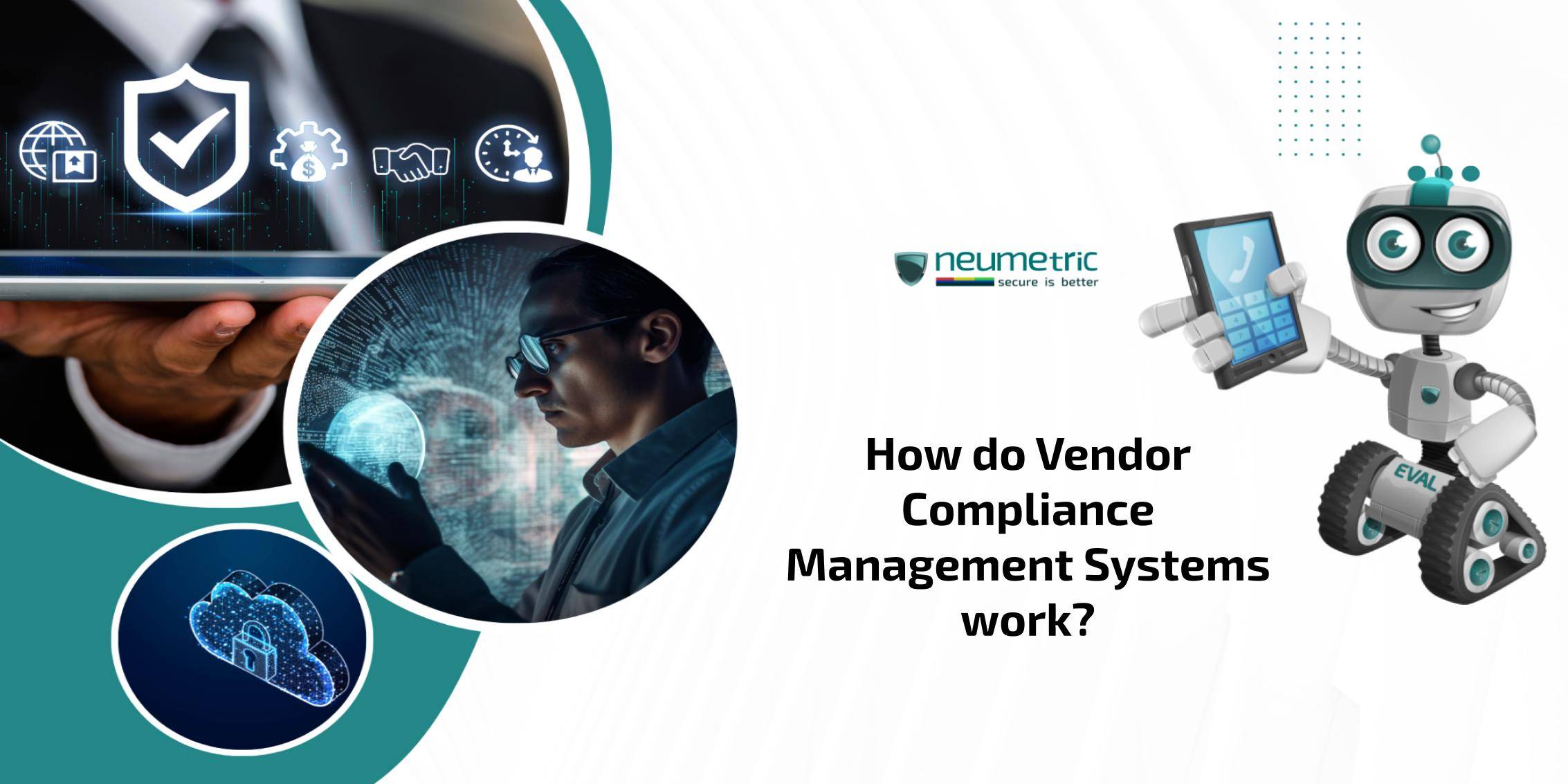Table of Contents
ToggleHow do Vendor Compliance Management Systems work?
Introduction
Vendor Compliance Management Systems are software systems or frameworks that help to streamline & automate the process of managing vendor relationships while adhering to regulatory regulations, industry standards & corporate policies. These technologies make it easier to onboard, qualify, monitor & evaluate vendors in order to reduce risks & comply with regulations.
Vendor compliance is critical for firms in all industries for various reasons. For starters, it reduces the risks associated with non-compliant vendors, such as legal penalties, reputational harm & supply chain interruptions. Second, adhering to compliance standards ensures the quality & dependability of products or services given by vendors, protecting the interests of both the company & its consumers. Additionally, vendor compliance promotes trust & transparency in supplier relationships, resulting in easier operations & improved business performance.
This journal delves further into Vendor Compliance Management Systems, their value to businesses & how they work. It will look at the definitions of these systems, their main components & their function in ensuring compliance throughout the vendor lifecycle. Understanding the foundations of Vendor Compliance Management Systems allows businesses to make informed decisions about deploying these solutions to improve vendor relationships & reduce compliance risks.
Understanding Vendor Compliance Management Systems
Vendor Compliance Management Systems include software platforms, tools & processes that businesses employ to manage & control vendor relationships while also ensuring compliance with applicable legislation & standards. These solutions enable the centralization of vendor-related data, automate compliance checks & provide insights into vendor performance, thereby improving the vendor management process & lowering compliance risks.
Key Components of Vendor Compliance Management Systems
- Vendor Onboarding: Vendor onboarding is the process of gathering & verifying information from new vendors prior to engaging in business activity. Vendor Compliance Management Systems make this process easier by offering electronic forms, document uploads & automated workflows for gathering & reviewing vendor information such as company licenses, certifications, financial statements & compliance papers. Standardizing & automating onboarding procedures allows businesses to verify that vendors meet regulatory standards & fit with company policies from the start.
- Vendor Qualification: Vendor qualification is the process of determining a vendor’s acceptability & trustworthiness using predetermined criteria such as financial stability, operational capabilities, quality standards & compliance history. Vendor Compliance Management Systems allow firms to set & adapt qualifying criteria, perform due diligence inspections & categorize vendors depending on risk level. Automated alerts & notifications provide prompt evaluation & approval of vendor qualifications, allowing organizations to make educated decisions about working with suppliers that satisfy their compliance & performance standards.
- Compliance Monitoring: Compliance monitoring involves ongoing oversight of vendor activities to ensure adherence to contractual agreements, regulatory requirements & industry standards. Vendor Compliance Management Systems automate compliance checks by monitoring key performance indicators [KPIs], tracking regulatory changes & flagging non-compliant behavior or deviations from established standards. Real-time dashboards & reporting tools provide visibility into vendor compliance status, enabling businesses to proactively identify & address compliance issues before they escalate.
- Performance Evaluation: Performance evaluation involves assessing the effectiveness & efficiency of vendor relationships based on predefined metrics, such as delivery timeliness, product quality, customer satisfaction & compliance performance. Vendor Compliance Management Systems facilitate performance evaluations through data analytics, trend analysis & benchmarking against industry standards. By identifying areas for improvement & recognizing top-performing vendors, businesses can optimize vendor relationships, drive operational excellence & enhance overall business performance.
Benefits of Implementing Vendor Compliance Management Systems
- Improved Risk Management: Implementing Vendor Compliance Management Systems allows businesses to reduce the risks associated with noncompliant vendors. Businesses can discover possible compliance concerns early on & take proactive steps to address them by centralizing vendor data, automating compliance checks & monitoring vendor activity in real time. This proactive approach reduces the possibility of regulatory infractions, legal penalties, supply chain interruptions & reputational harm, ultimately improving overall risk management effectiveness.
- Enhanced Operational Efficiency: Vendor Compliance Management Systems improve operational efficiency by streamlining & automating manual vendor management operations. Businesses that replace paper-based or ad hoc processes with standardized electronic workflows can minimize administrative overhead, remove redundant jobs & maximize resource allocation. Automated alerts, notifications & reminders ensure that compliance-related tasks are completed on time, while consolidated data repositories make key information easily accessible, speeding decision-making & encouraging cross-departmental collaboration.
- Strengthened Supplier Relationships: Vendor Compliance Management Systems serve an important role in promoting transparency, trust & collaboration in supplier relationships. Businesses can effectively communicate compliance needs to vendors by offering clear expectations, defined processes & performance measurements, as well as reciprocal accountability for compliance results. Real-time visibility into vendor performance & compliance status allows businesses to recognize & reward top performers while also identifying areas for improvement & giving targeted assistance or training as needed. This collaborative strategy builds supplier relationships, encourages continual development & fosters long-term partnerships built on similar values & goals.
- Regulatory Compliance: Perhaps the most major advantage of deploying Vendor Compliance Management Systems is that it ensures regulatory compliance throughout the vendor lifecycle. Businesses can demonstrate compliance with relevant laws, regulations & industry standards by automating compliance checks, following regulatory changes & preserving audit trails on vendor operations. This not only reduces the danger of regulatory infractions & penalties, but also builds trust among stakeholders such as customers, investors & regulatory agencies. Compliance with regulatory regulations also improves the company’s reputation, competitiveness & market credibility, laying the way for long-term growth & success in today’s highly regulated business landscape.
Challenges in Vendor Compliance Management
Data Security & Privacy Concerns: One of the most difficult difficulties in Vendor Compliance Management is guaranteeing the confidentiality & privacy of sensitive vendor data. Businesses must establish strong data protection measures, including encryption, access controls & frequent security audits, to secure vendor information from unauthorized access, breaches, or misuse. Additionally, compliance with data privacy regulations, such as the General Data Protection Regulation [GDPR] or the California Consumer Privacy Act [CCPA], requires businesses to follow strict data handling practices & obtain vendor consent before collecting, storing & processing their personal information.
Complexity of Vendor Networks: Another problem in Vendor Compliance Management is managing the complexity of vendor networks, particularly in global supply chains with several vendors from various countries & industries. When working with vendors, businesses must traverse a variety of legal regulations, cultural variations & language limitations, all of which can hinder compliance. Standardizing compliance practices, utilizing technology for communication & cooperation & completing rigorous due diligence checks can assist firms in addressing the complexities of vendor networks & ensuring consistent compliance standards throughout the supply chain.
Ensuring Consistency & Standardization: Maintaining consistency & standardization in vendor compliance practices can be challenging, particularly in decentralized or fragmented organizational structures. Different departments or business units may have varying interpretations of compliance requirements, leading to inconsistencies in vendor management processes & practices. Businesses must establish clear policies, procedures & communication channels to ensure alignment & consistency in compliance standards across the organization. Training & education programs can also help reinforce compliance expectations & promote a culture of accountability & standardization among employees involved in vendor management activities.
Key Features to Look for in Vendor Compliance Management Systems
Automated Compliance Checks: Automated compliance checks are critical components of Vendor Compliance Management Systems, allowing businesses to automate & accelerate the process of reviewing vendor compliance. These systems should be able to automatically scan vendor data for established compliance criteria, such as regulatory requirements, industry standards & corporate rules. Automated alerts & notifications should alert stakeholders to any compliance violations or deviations, enabling for immediate action to rectify issues & mitigate risks. Businesses that automate compliance checks can decrease manual work, limit human mistake & assure consistent adherence to compliance standards throughout the vendor lifecycle.
Customizable Compliance Criteria: Flexibility & customization options for compliance criteria are crucial features of Vendor Compliance Management Systems, as they allow businesses to tailor compliance requirements to their specific needs & regulatory environment. These systems should enable businesses to define & configure compliance criteria based on factors such as industry regulations, geographic location, vendor risk level & business objectives. Customizable compliance criteria empower businesses to adapt to changing regulatory requirements, incorporate industry best practices & address unique compliance challenges effectively.
Integration Capabilities: Integration capabilities are essential features of Vendor Compliance Management Systems, enabling seamless connectivity with other business systems & data sources. These systems should offer robust integration capabilities to exchange data with enterprise resource planning [ERP] systems, procurement platforms, supplier databases & third-party compliance databases. Integration with external data sources, such as regulatory databases, industry benchmarks & sanctions lists, allows businesses to enrich vendor profiles with up-to-date compliance information & enhance risk assessment capabilities.
Steps to Implement Vendor Compliance Management Systems
- Assessing Vendor Compliance Needs: The first step in implementing Vendor Compliance Management Systems is to assess the organization’s vendor compliance needs, including regulatory requirements, industry standards & internal policies. Businesses should conduct a comprehensive review of existing vendor management processes, identify compliance gaps & inefficiencies & define specific objectives & requirements for the new system.
- Selecting the Right Vendor Compliance Management System: Once the vendor compliance criteria have been defined, firms should compare the various Vendor Compliance Management Systems available on the market & choose the one that best fulfills their needs. System features, scalability, user-friendliness, vendor support & cost-effectiveness are all important considerations in the decision process. Businesses should also consider the vendor’s reputation, experience & track record for providing compliance management systems.
- Vendor Onboarding & Training: Following the selection of a Vendor Compliance Management System, firms should focus on onboarding vendors & providing training & assistance to ensure a smooth transition. This may include creating vendor accounts, specifying compliance requirements & training vendors on how to utilize the system efficiently. Clear communication & assistance are critical for ensuring that suppliers understand their compliance duties & can traverse the system effectively.
- Monitoring & Continuous Improvement: Once the Vendor Compliance Management System is implemented & vendors are onboarded, businesses should establish processes for monitoring vendor compliance & performance on an ongoing basis. This includes regular reviews of compliance metrics, performance reports & audit trails generated by the system. Businesses should also solicit feedback from stakeholders, including vendors, employees & customers, to identify areas for improvement & implement corrective actions as needed. Continuous monitoring & improvement are critical to maintaining compliance effectiveness & adapting to changing regulatory requirements & business conditions over time.
Best Practices for Effective Vendor Compliance Management
- Establishing Clear Policies & Procedures: Clear & well-defined policies & procedures are the cornerstones of efficient vendor compliance management. Businesses should create comprehensive vendor compliance rules that include regulatory obligations, industry standards & internal norms. These policies should be presented to all stakeholders, including workers & vendors, to ensure that everyone understands the expectations for compliance. Businesses can also implement standardized protocols for vendor onboarding, qualification, monitoring & performance evaluation to promote consistency & accountability in compliance management operations. Policies & procedures should be updated on a regular basis to meet changing regulatory requirements & business needs.
- Communication & Collaboration with Vendors: Effective communication & engagement with vendors are critical to successful vendor compliance management. Businesses should maintain open lines of communication with their vendors & develop collaborative partnerships built on trust & transparency. This includes properly explaining compliance standards, objectives & performance indicators to vendors while also providing continuous support & guidance as needed. Regular meetings, training sessions & feedback mechanisms should be developed to promote conversation & resolve any compliance-related issues or concerns early on. Businesses can establish a culture of collaboration & partnership with vendors, promoting mutual understanding, alignment & accountability for compliance objectives.
- Regular Audits & Reviews: Regular audits & reviews are critical components of vendor compliance management, providing businesses with insights into the effectiveness of their compliance programs & identifying areas for improvement. Businesses should conduct periodic audits of vendor compliance activities, including documentation, processes & performance metrics, to ensure adherence to regulatory requirements & internal policies. These audits should be conducted by qualified personnel or third-party auditors with expertise in vendor compliance management. Additionally, businesses should establish processes for ongoing reviews of vendor performance & compliance status, including regular evaluations of key performance indicators [KPIs], metrics & benchmarks. By conducting regular audits & reviews, businesses can identify compliance gaps, assess risks & implement corrective actions to strengthen their vendor compliance programs over time.
Conclusion
Vendor Compliance Management Systems are critical in helping businesses reduce risks, manage regulatory compliance & maximize vendor relationships. By automating compliance checks, optimizing processes & providing visibility into vendor operations, these technologies help businesses improve their risk management effectiveness, operational efficiency & supplier collaboration. Furthermore, efficient vendor compliance management is critical for maintaining a company’s reputation & integrity, building confidence with stakeholders & guaranteeing long-term viability & success in today’s complicated business climate.
Businesses should make vendor compliance management a strategic goal & use best practices to improve compliance results. Businesses can enhance & reduce compliance risks by having clear policies & procedures, encouraging communication & collaboration with vendors & performing frequent audits & reviews. Businesses should also use technological solutions, such as Vendor Compliance Management Systems, to streamline compliance procedures, automate repetitive operations & improve compliance effectiveness. Finally, investing in good vendor compliance management protects firms from legal & reputational risks while also providing chances for development, innovation & a competitive advantage in the marketplace.
FAQ
What is vendor compliance management?
Vendor compliance management involves the process of ensuring that vendors adhere to regulatory requirements, industry standards & internal policies set forth by a business.
Why is vendor compliance management important for businesses?
Vendor compliance management is essential for businesses to mitigate risks associated with non-compliant vendors, maintain regulatory compliance, protect their reputation & build trust with stakeholders.
What are the key components of vendor compliance management systems?
Key components of vendor compliance management systems include automated compliance checks, customizable compliance criteria, integration capabilities with other business systems & robust reporting & analytics functionalities.





